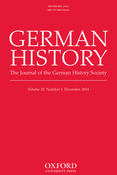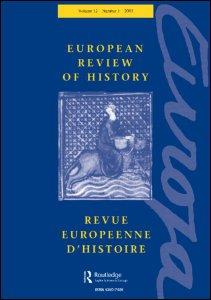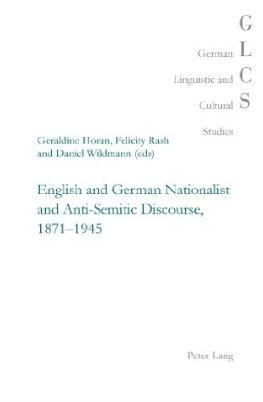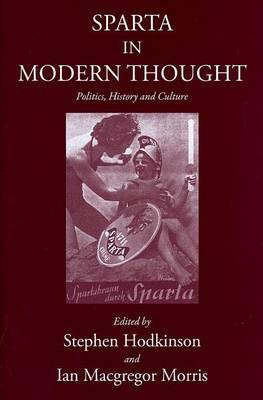Articles
 'Xenophon and the Nazis: A case study in the politicisation of Greek thought through educational propaganda'
'Xenophon and the Nazis: A case study in the politicisation of Greek thought through educational propaganda'Classical Receptions Journal 8 (1), 2016 (special issue on The Legacy of Greek Political Thought, edited by Barbara Goff and Miriam Leonard), pp. 71-89.
During the Third Reich, radical reinterpretations of Classical texts were always on the agenda. The Reich Education Ministry decreed that only those ancient texts which were deemed of value for the Nazi regime’s new ‘national-political’ education should be taught in schools. This sometimes led to the pre-eminence of texts which had previously been considered less worthy – the writings of Xenophon being a case in point.Read more...
 'Surviving Stunde Null: Narrating the fate of Nazi elite-school pupils during the collapse of the Third Reich'
'Surviving Stunde Null: Narrating the fate of Nazi elite-school pupils during the collapse of the Third Reich'German History 33 (4), 2015, pp. 570-87. Winner of German History journal's "Best Article of 2015" prize.
This paper considers the experiences of one particular, rarely-discussed group of 'war children': former pupils of the Napolas – the most prominent type of Nazi elite-school. Drawing upon a variety of original testimonies, the paper explores the hardships and dilemmas which Napola-pupils faced as World War II drew to a close, and the ways in which former pupils have constructed this aspect of their past.Read more...
 'Kadettengeschichten: Exploring the Prussian cadet-school story'
'Kadettengeschichten: Exploring the Prussian cadet-school story'in Books for Boys: Literacy, Nation and the First World War, ed. Simon James, Durham (DIAS) 2014, pp. 20-5.
This short essay investigates a little-known genre of German children's literature, the Prussian cadet-school story, exploring the ways in which patriotic feeling and the prospect of a martial career were justified or glorified in volumes such as Paul von Szczepanski’s Spartanerjünglinge (Spartan Youths) and Johannes van Dewall’s Kadettengeschichten (Cadet-Tales).Read more...
 'Zwischen Freundschaft und Feindschaft: Exploring relationships between pupils at the Napolas and British public schoolboys'
'Zwischen Freundschaft und Feindschaft: Exploring relationships between pupils at the Napolas and British public schoolboys'in Angermion: Yearbook for Anglo-German Literary Criticism, Intellectual History and Cultural Transfers / Jahrbuch für britisch-deutsche Kulturbeziehungen 6, 2013, pp. 101-26.
Between 1934 and 1939, pupils from the Nationalpolitische Erziehungsanstalten engaged in a series of exchanges with boys from British public schools. This article explores in detail the Anglo-German relationships – including tensions and prejudices – which were forged between pupils and staff during these exchanges, focusing on exchange programmes with Dauntsey's, Kingswood, and The Leys.Read more...
 '"Wanderer, kommst du nach Pforta…": The tension between Classical tradition and the demands of a Nazi elite-school education at Schulpforta and Ilfeld, 1934–1945'
'"Wanderer, kommst du nach Pforta…": The tension between Classical tradition and the demands of a Nazi elite-school education at Schulpforta and Ilfeld, 1934–1945'in European Review of History / revue européenne d'histoire 20 (4), 2013, pp. 581-609.
This article explores the tensions which arose when Schulpforta, Germany’s most renowned humanistic boarding-school, was forcibly turned into a Nazi elite-school (a Nationalpolitische Erziehungsanstalt, or Napola). The time-honoured traditions of Christianity and enlightened humanism previously cultivated at the erstwhile Landesschule zur Pforta (alma mater of Fichte, Ranke and Nietzsche) were swiftly subordinated to the demands of national-socialist ideology.Read more...
 ‘"Anti-Enlightenment": National Socialist Educators' Troubled Relationship with Humanism and the Philhellenist Tradition'
‘"Anti-Enlightenment": National Socialist Educators' Troubled Relationship with Humanism and the Philhellenist Tradition'in Publications of the English Goethe Society 82 (3), 2013, pp. 193-207.
This article examines some of the ways in which scholars and educators under National Socialism attempted to construct a model of philhellenism for the ‘Thousand Year Reich’ which explicitly defined itself as descended from, yet opposed to, earlier manifestations of the phenomenon, especially as personified by Enlightenment figures such as Winckelmann and Goethe. They also proclaimed a return to the true, ‘living’ spirit of the original Greek gymnasion.Read more...
 "'In Sparta fühlte ich mich wie in einer deutschen Stadt" (Goebbels): The Leaders of the Third Reich and the Spartan Nationalist Paradigm'
"'In Sparta fühlte ich mich wie in einer deutschen Stadt" (Goebbels): The Leaders of the Third Reich and the Spartan Nationalist Paradigm'in English and German Nationalist and Antisemitic Discourse, 1871-1945, ed. Felicity Rash, Geraldine Horan, Daniel Wildmann, Oxford (Peter Lang) 2013, pp. 91-115.
This article examines some of the ways in which many of the Third Reich's leading figures (including Hitler, Goering, Goebbels, Rust and Rosenberg) treated Sparta as the perfect paradigm of a racially-pure warrior-state, as well as claiming that, in a certain sense, the Reich was Sparta incarnate.Read more...
 'Spartan Supremacy: A "Possession for Ever"? Early fourth-century expectations of enduring ascendancy'
'Spartan Supremacy: A "Possession for Ever"? Early fourth-century expectations of enduring ascendancy'in Hindsight in Greek and Roman History, ed. Anton Powell, Swansea (Classical Press of Wales) 2013, pp. 91-112.
This article explores and analyses the ways in which historians, both modern and ancient, have applied hindsight to the Spartan empire of 404-371 B.C., and to its downfall. Many modern treatments of the period are even labelled as studies in Spartan failure, and thus betray a tendency to over-emphasise error and lack of foresight on the part of Sparta.Read more...
 '"Spartanische Pimpfe": The Importance of Sparta in the Ideology of the Adolf Hitler Schools'
'"Spartanische Pimpfe": The Importance of Sparta in the Ideology of the Adolf Hitler Schools'in Sparta in Modern Thought. Politics, History and Culture, ed. Stephen Hodkinson, Ian Macgregor Morris, Swansea (Classical Press of Wales) 2012, pp. 315-42.
This article explores the ways in which an ancient history textbook by the well-known archaeologist and educator Otto-Wilhelm von Vacano, entitled 'Sparta: The Life-Struggle of an Aryan Master Race', was used to encourage pupils at the Adolf Hitler Schools to identify with young Spartans, and to see Spartan history in proto-National Socialist terms.Read more...
 '"Go, tell the Prussians…": The Spartan paradigm in Prussian military thought during the long nineteenth century'
'"Go, tell the Prussians…": The Spartan paradigm in Prussian military thought during the long nineteenth century'in New Voices in Classical Reception Studies ejournal, Issue 7 (2012), pp. 25-39.
This article examines the ways in which Ancient Spartan history and mores, and in particular the Spartan art of war, were often portrayed as providing useful precedents for the Prussian military. Commentators frequently saw the Officer-Corps as embodying a type of ‘new Sparta’ in Prussia, recreating a similarly militaristic and socially exclusive society in contemporary terms.Read more...
